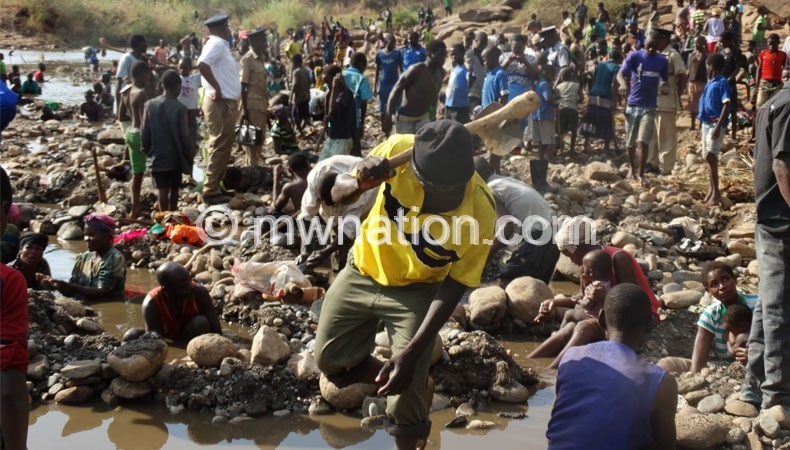Should mining in Malawi Be considered illegal?
In July 2013, Malawi’s then minister responsible for mining, John Bande told The Nation newspaper that Malawi government was engaging experts from University of Dundee, Scotland, United Kingdom to help train Malawians in mining law “to prevent further ‘robbery’ of the country’s mineral wealth through poorly negotiated contracts.”
Bande could have added that another grey area in the industry is lack of transparency on the part of the government. But, Malawi Government must be commended for publicly coming clean and accepting substantial shortfalls in this crucial industry. This is an industry that in July 2013 Financial Times of London said could be Malawi’s “next economic frontier”.

“Malawi ticks all the boxes in terms of resource potential, stable environment, infrastructure and government support,” the newsapaper quoted Will Dawes of Canadian company, Mkango Resources, which runs Songwe Hill Rare Earth Element Project in Phalombe.
This highly acclaimed potential justifies Bande’s fears. Peter Cameron of Centre for Energy, Petroleum and Mineral Law and Policy told The Nation that many countries in the world have not benefited from their resources because of poor management. Africa has numerous such cases; countries such as mineral-rich Democratic Republic of Congo have ended up in endless conflicts while others like oil-rich Angola have contributed to unhealthy gap between the rich and the poor.
Yet, countries such as Botswana have managed its mineral resources very well that it has benefited the country and its people.
On his last visit, during Peter Mutharika’s swearing in ceremony, Ian Khama, Botswana’s president, offered his country’s help to Malawi’s mining sector. It is not known if Malawi government has taken up that offer.
In the absence of legal expertise on mining, as confirmed by Bande, the best Malawi government could do is to halt all mining activities and renegotiate all the contracts where necessary.
In 2013, the Kenyan government revoked mining licence for lack of transparency. Last August, Nigeria federal State withdrew over 600 mining licences from companies that failed to comply with regulation and rules. In the case of Malawi, this could mean keeping all minerals in the ground until appropriate legal framework, which guarantees that all Malawians benefit from the resources, not only privileged few.
Government has issued at least 26 mining licences since 2009. Who is benefiting from these mining activities? Why is that mining deals are a matter of government secret? Malawi is now into its third administration since 2009, yet, all the three governments have kept mining deals secret. There is a tendency to blame multinational corporations involved in mining—most notably Paladin Africa, operators of Kayelekera Uranium Mine in Karonga. Yet, multinational corporations are here to make profits, not to look after Malawians. It is Malawi government’s duty to ensure its citizens benefit from these mining deals.
Should all the mining ventures that fail to benefit Malawi and its people fall into this ‘illegal’ category? Could Malawi government explain how it has moved from its worries of being ‘robbed’ of its mineral wealth to the point where it has now turned to its own people and view them as ‘illegal’ miners?
The greatest mining swindle is by multinational corporations and Malawi government is complicit in this. n





